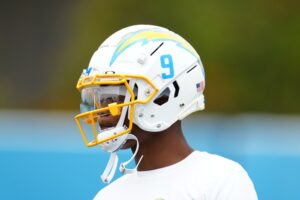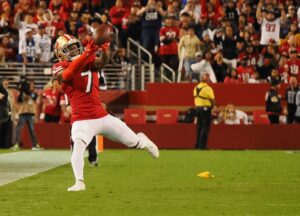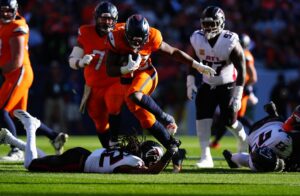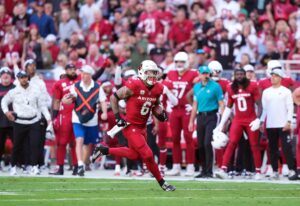Finding a reliable tight end is one of the hardest parts of playing fantasy football, and Irv Smith could have the opportunity to break out during his third year. The former second-round pick spent the first two years of his career behind Kyle Rudolph but could shine following Rudolph’s release. This offseason optimism is not uncommon, and misplaced trust has ruined many a season in years past. Let’s take a look at both Smith’s opportunity and talent to see if he’s ready to be a reliable weapon in 2021.
Fantasy Football: Irv Smith Outlook Without Kyle Rudolph
The Opportunity
When looking purely at the season-long numbers, Irv Smith left a lot to be desired last year. Appearing in all 16 games, Smith finished with 30 receptions for 365 yards and five touchdowns, making him the TE22 on the season. However, this doesn’t tell the full story, as Smith went absolutely haywire with Rudolph out of the lineup.
Rudolph missed the final four games of the season, leaving Smith as the unquestioned top tight end on the depth chart. During that stretch, Smith recorded 15 receptions for 183 yards and three touchdowns, making him the TE8 in PPR. This is obviously encouraging, but it’s a very small sample and isn’t necessarily sustainable. After all, a good portion of the fantasy community bought into Tyler Higbee after a similar stretch of play, so let’s take a deeper look at Smith’s final month to see how sustainable this is.
[pickup_prop id=”3868″]
Touchdowns are incredibly unstable from year-to-year, so it should be a massive red flag that almost 42% of Smith’s fantasy points over the final four games of the season came from touchdowns. He only had one game with more than four targets, and his 45.9 weighed opportunity was the 17th-best among tight ends.
Weighed opportunity, for those unfamiliar with the metric, is exactly what it sounds like. Essentially, it’s a statistic that takes the expected value of air yards and red zone targets and then scales it relative to other players at the position. Smith ranking 17th over the final month of the season tells us that he dramatically overproduced relative to expectation and that he probably won’t be able to put up those kinds of numbers again.
Chasing Targets and Offensive Philosophy
Volume is king in fantasy football, and Smith will see a larger role with Rudolph out of the picture. However, an increased role doesn’t necessarily lead to fantasy stardom. As previously mentioned, Smith wasn’t exactly a target machine in the four games without Rudolph. This wasn’t just a matter of the coaching staff not being able to adjust on the fly, as tight ends were never a major part of the gameplan. Overall, Rudolph leaves just 37 vacated targets for Smith, which isn’t nearly enough for fantasy relevance.
Outside of maybe Pete Carroll, nobody believes in running the football more than Mike Zimmer. Minnesota’s head coach isn’t going anywhere, which means that this offense will continue to run through Dalvin Cook. When dropping back to pass, Smith will be no better than the third option behind Justin Jefferson and Adam Thielen. Quite frankly, it’s hard to see Smith getting enough of a workload to be consistently fantasy-relevant as the third option in a run-first offense, especially when Dalvin Cook is also going to see plenty of targets.
This doesn’t even account for the possible dip in overall performance from a new offensive coordinator. Gary Kubiak was quietly one of the better offensive minds in the league, and now Minnesota is handing off the keys to Kubiak’s son. There’s obviously no way to tell if Klint Kubiak will be as good as his father, but there will probably be some growing pains. This is bad news for Minnesota’s entire offense, but it’s especially bad for someone like Smith, as he’ll need to make the most of every last target in order to be fantasy-relevant.
Irv Smith the Fantasy Football Player
Volume might be king in fantasy football, but truly great players find a way to rise to the top. If Smith is a legitimately dangerous threat in the passing game, then Minnesota will adjust their philosophy and find a way to incorporate a rising star. After all, they did it last year with Justin Jefferson.
Unfortunately, it’s hard to imagine Smith making that type of breakout. The Alabama product is a good tight end, but there isn’t much to suggest he’s anything more than a league-average starter. His first two years in the league were very pedestrian, and we’ve already established that what he did at the end of the season isn’t likely to repeat.
From an athletic standpoint, Smith is nothing special relative to the typical NFL player. According to PlayerProfiler, Smith had a 60th-percentile SPARQ score, 26th percentile burst score, and 71st percentile speed score. Athleticism isn’t everything, but it certainly helps, and none of Smith’s measurables suggest that he is a physical freak like the George Kittle or Travis Kelce’s of the world.
Smith obviously didn’t produce much during his first two years in the league, but that’s not too surprising. After all, tight end is one of the hardest positions to learn and just about every player needs some time to adjust to life in the NFL. However, the Alabama product wasn’t even that much of a receiving threat in college, posting a pedestrian 36th percentile college dominator. Now, it’s worth noting that he played at Alabama and had to fight off elite competition for some of those targets.
Overall, Irv Smith seems like he’s more hype than actual hope right now. His four-game stretch without Rudolph was incredibly unsustainable, the volume isn’t there, and he’s never demonstrated the ability to be an elite receiving tight end. There is a chance that he pulls off a Robert Tonyan type of breakout season, but chances are he won’t be anything more than the TE12-15 next year.
Main photo:
Embed from Getty Images






